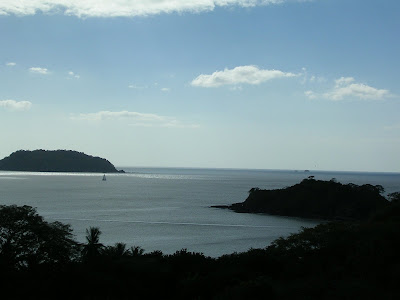


4/25/01
I suppose I should set the scene a little better. I live eight miles outside of a town called Puerto Viejo De Sarapiqui. The town has a few small markets, bars, and shops with cheaply made plastic objects. There is an Internet café, but it’s expensive and has a slow connection, so I try not to use it. The buildings are painted in various pastel colors. Most buildings and houses have rusted metal roofs.
The town is a bit run-down and molded over from all of the rain and humidity. Litter is tossed about. (Today as I rode the bus, the man in the seat in front of me finished his drink and threw it out the window. Such is the way in Latin America).
I don’t do much in town except for occasionally using the internet café and getting my favorite drink-an iced blend of milk and mango Also, I go to town when I need to catch a connecting bus to a distant place. The buses are cheap and reliable and I’d just as soon never drive in Costa Rica.
Most houses are single story with one to two bedrooms. They are modest and not overly poverty stricken. This is rural Costa Rica and families usually have chickens and scrawny mini-dogs running around. Some fields have horses or tan-colored cows with long sagging ears. I hate to look too closely at any of the animals because they aren’t kept in good health. Too often I see animals with infected open wounds or ribs that nearly pop out of their skin. It turns my stomach or makes me sad. I don’t fully understand why animals are treated this way. Yes, it’s because of poverty, but it’s more that that. There is a different mentality concerning animals. At this point it seems that people don’t empathize with animals, and definitely don’t attribute human-like emotions to animals as we American often do.
I came home a few days ago to find out my host family had acquired a Rottwhiler. This was not a pleasant discovery. Like most dogs here, it remains tied up on a six-foot leash and never gets taken on a walk. I hate guard dogs, but I feel for it. My host family would think I was strange if I asked to take the dog for a walk.
Sometimes Xinia makes me something for breakfast that I just can’t stomach. (Usually she’s a great cook, but Costa Ricans will eat the greasiest things for breakfast: rice, beans, fried yucca, and mayonnaise...) When I wake, coffee is made, and breakfast is sitting out, (fantastic dark Costa Rican coffee.) Xinia leaves for work in the morning. For a while I discovered that the dog savored that which I could not stomach. I’d stand at a distance and toss the tidbits his way. This routine didn’t last long, because one day as I tossed something his way, he didn’t eat it. This was a problem since I didn’t want Xinia to know that I had fed any of her cooking to the dog. This would be seen as an incredible insult. I decided to ask Xinia to only leave me bread and fruit for breakfast.
I know it sounds weird that I have someone cooking for me, but that’s the arrangement. The only money I make by teaching goes towards my room and board with my host family. It’s a decent amount of money to add to the family’s monthly income.
My house is quaint. There is slightly tattered but comfortable furniture. The kitchen and living room are and there are two small bedrooms. Xinia, Roberto, and Joseph sleep in one room and I sleep in the adjacent bedroom. There is a nice, tiled shower with no hot water. Most people don’t have hot water. It’s always hot and humid and I don’t mind taking cold showers here. At first my showers were @45 seconds, but now I wash my hair and everything.
There are 16 chickens and chicks that run around the yard and occasionally a neighbor’s horse is parked in the driveway. The front yard is thick with tropical flowers of all colors; tropical birds and butterflies come to feed on the flowers. There’s a palm tree outside of my window and soon Xinia is going to show me how to knock the coconuts down and machete a hole in the top of the coconut, so that I can drink the agua de pipa.
Xinia keeps the house spotless, as spotless as one can in the rainforest. Even though the house is spotless, I recently discovered an awful secret of the night. When the lights are turned off, they all come out. Late one night I had to pee, and when I walked into the living room and tuned the light on, big brown cockroaches scurried and skidded across the living room floor. They were on every counter top, running over the couch, across the floor, everywhere. Yuck. I love God’s creatures but these give me the willies.
Before I sign off, my latest language blooper: For the last week I have been thinking that I was saying to Xinia, “I have fear of snakes, I have fear of flying, I have fear of....” but I was mistaking “miedo” (fear) with “mierda” (shit) and saying to Xinia, “ I have shit of snakes, I have shit of flying...” and so on.
My friend Sarah recently told me a blooper of an English student in her class. He came up to her intending to say, “I can never put my floppy disk in the computer,” and he accidentally said, “ I can never put my floppy dick in the computer.” Oh, these are great.
I’m off to bed for the night, but I’ll write soon,
Laura







